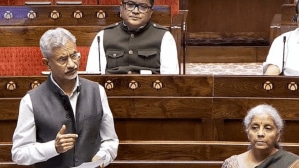Crop insurance scam: FIR filed against 40 service centre operators for filing 4,453 bogus claims
The CSC operators are digital access points that help farmers submit government-related applications including the crop insurance.
 An agriculture department official said, “This wasn’t random misuse—it was systemic fraud using software access, document manipulation, and mass-uploading of applications. The action in Nanded is just the beginning. More such clusters are under investigation.”
An agriculture department official said, “This wasn’t random misuse—it was systemic fraud using software access, document manipulation, and mass-uploading of applications. The action in Nanded is just the beginning. More such clusters are under investigation.”
INITIATING ACTION in one of the biggest crop insurance frauds in Maharashtra under the Pradhan Mantri Fasal Bima Yojana (PMFBY), the agriculture department has filed an FIR against 40 Common Service Centre (CSC) operators in Nanded district for allegedly filing 4,453 bogus crop insurance applications during the kharif 2024 season.
The CSC operators are digital access points that help farmers submit government-related applications including the crop insurance.
According to the FIR registered in Nanded Rural police station, accessed by The Indian Express, the CSC operators submitted applications in the names of farmers, without their knowledge, using fake or manipulated land ownership documents, self-declarations, and bank details. In certain cases, the insurance was also claimed on government-owned land, non-agricultural land (NA), and plots without valid lease agreements or consent from the actual landholders.
The complaint was filed by Madhav Gopal Channe, Agricultural Officer, Nanded, who alleged that several applications were uploaded through the PMFBY portal by CSCs using forged 7/12 extracts and other falsified documents. “The fraudulent entries were detected during document verification conducted by United India Insurance Company, which flagged the anomalies in February 2025,” the FIR stated.
The FIR further names farmers from districts such as Beed, Parbhani, Pune, Latur, Jalna, and even Uttar Pradesh whose names and details were misused without authorisation. The CSC operators allegedly exploited software loopholes and bypassed verification norms in an attempt to siphon off government insurance payouts.
Following the initial red flags raised by the insurer, the agriculture department formed a district-level inquiry committee on March 4, 2025, under the chairmanship of the Nanded District Collector. The investigation confirmed that over 10 CSCs had filed more than 100 bogus applications each.
The police complaint, officially registered at the Nanded Rural police station on May 29, 2025, states: “With intent to fraudulently claim crop insurance benefits, 4,453 fake applications were filed using land not legally owned, leased, or consented for use. These included names of out-of-state farmers. Legal action should be initiated against the 40 CSC operators involved.”
Fallout of ₹1 premium crop insurance scheme
The scam is the latest in a series of irregularities that emerged after the state government’s now-scrapped ₹1 crop insurance scheme. Introduced in 2023 by the Eknath Shinde-led Mahayuti government, the scheme brought the farmer contribution for crop insurance down to ₹1, resulting in applications jumping from 1.04 crore (2022) to 2.42 crore in 2023.
However, the scheme quickly came under scrutiny after widespread misuse. By early 2024, over five lakh applications were identified as bogus across the state, with claims filed for barren land, religious institutions, petrol pumps, and industrial estates.
Most of these bogus claims were made through the CSC operators. The government has also blocked IDs of 140 CSC operators who were allegedly involved in the bogus applications.
In April 2025, the government scrapped the ₹1 scheme, reverting to the original PMFBY structure, which mandates a 2% premium for kharif crops, 1.5% for rabi crops, and 5% for commercial and horticultural crops.
A new Government Resolution issued last month has introduced strict penalties, including criminal prosecution and a five-year ban on accessing any government subsidies or welfare schemes for those found guilty of fraudulent claims—farmers and CSC operators alike.
As part of broader reforms, the government has made farmer ID and e-Peek Pahani (digital crop inspection) mandatory for all future insurance claims.
An agriculture department official said, “This wasn’t random misuse—it was systemic fraud using software access, document manipulation, and mass-uploading of applications. The action in Nanded is just the beginning. More such clusters are under investigation.”












